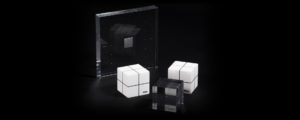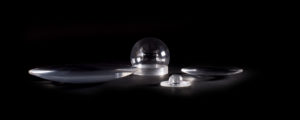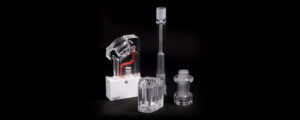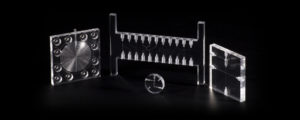Acrylic (PolyMethyl MethAcrylate or PMMA) is a transparent plastic known more commonly by the trade name “Plexiglass™.” The material is similar to polycarbonate in that it is suitable for use as an impact resistant alternative to glass. It was first produced in 1928 and was brought to market five years later by Rohm and Haas Company. It is generally considered one of the clearest plastics available.
Advantages of Acrylic:
- Excellent optical clarity & transparency
- Highly resistant to variations in temperature
- Up to 17 times the impact resistance of ordinary glass
- Half the weight of glass and ideal for precision machining
- Highly resistant to many different chemicals
Acrylic (PMMA*) has certain properties making it an ideal material for use in a wide range of applications, including: medical, life sciences and food / beverage testing.
*PMMA – PolyMethyl MethAcrylate. Crylux, Plexiglas, Acrylite, Lucite, and Perspex are trade names for Acrylic.
Technical specification:

- General Properties: Relative Density 1.19 g/cm3 Rockwell Hardness M 102 Water Absorption -.2% ~Flammability Class 3, (BS 476 pt 7) UL94 HB
- Mechanical: Tensile Strength 75 MPa Flexural Strength 115 MPa
- Thermal Properties: Minimum Service Temperature -40⁰C Maximum Service Temperature 80⁰C Softening Point > 110⁰C Linear Expansion 7.7×10-5
- Optical Properties: Light Transmission > 92% Refractive Index 1.49

Excellent Optical Clarity & Transparency
Acrylic plastic is extremely transparent, offering excellent light transmission properties and offers excellent optical clarity (when either MOP or vapour polished) similar to glass and is able to transmit 92 percent of white light. Perspex and Rohm Plexiglas are both ideally suited to the manufacture of light guides & lenses.
Impact Resistant & Lightweight
Acrylic sheets (Plexiglas) can have up to 17 times the impact resistance of ordinary glass and have very good resistance to component breakage through shock or impact. It is also half the weight of glass and is ideal for machining into Precision components.

Temperature Resistant
Acrylic plastic is highly resistant to variations in temperature, making it ideal for using in the manufacture of medical manifolds and microfluidics devices and can be fully heated treated and diffusion bonded.

Chemical Resistant
Acrylic plastic is highly resistant to many different chemicals, again making it ideal for using it in the manufacture of medical manifolds and microfluidics & fluidic manifold and devices.
Further reading – Key Properties of Cast Acrylic



